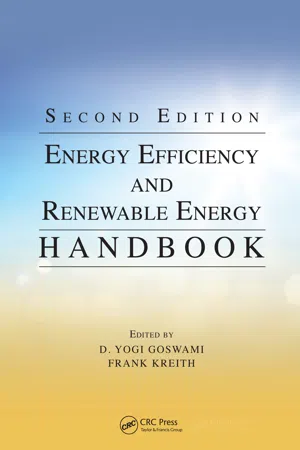
eBook - PDF
Energy Efficiency and Renewable Energy Handbook
- 1,846 pages
- English
- PDF
- Available on iOS & Android
eBook - PDF
Energy Efficiency and Renewable Energy Handbook
About this book
For the Movers, Shakers, and Policy Makers in Energy Engineering and Related IndustriesThe latest version of a bestselling reference, Energy Efficiency and Renewable Energy Handbook, Second Edition covers the foremost trends and technologies in energy engineering today. This new edition contains the latest material on energy planning and policy, wi
Frequently asked questions
Yes, you can cancel anytime from the Subscription tab in your account settings on the Perlego website. Your subscription will stay active until the end of your current billing period. Learn how to cancel your subscription.
No, books cannot be downloaded as external files, such as PDFs, for use outside of Perlego. However, you can download books within the Perlego app for offline reading on mobile or tablet. Learn more here.
Perlego offers two plans: Essential and Complete
- Essential is ideal for learners and professionals who enjoy exploring a wide range of subjects. Access the Essential Library with 800,000+ trusted titles and best-sellers across business, personal growth, and the humanities. Includes unlimited reading time and Standard Read Aloud voice.
- Complete: Perfect for advanced learners and researchers needing full, unrestricted access. Unlock 1.4M+ books across hundreds of subjects, including academic and specialized titles. The Complete Plan also includes advanced features like Premium Read Aloud and Research Assistant.
We are an online textbook subscription service, where you can get access to an entire online library for less than the price of a single book per month. With over 1 million books across 1000+ topics, we’ve got you covered! Learn more here.
Look out for the read-aloud symbol on your next book to see if you can listen to it. The read-aloud tool reads text aloud for you, highlighting the text as it is being read. You can pause it, speed it up and slow it down. Learn more here.
Yes! You can use the Perlego app on both iOS or Android devices to read anytime, anywhere — even offline. Perfect for commutes or when you’re on the go.
Please note we cannot support devices running on iOS 13 and Android 7 or earlier. Learn more about using the app.
Please note we cannot support devices running on iOS 13 and Android 7 or earlier. Learn more about using the app.
Yes, you can access Energy Efficiency and Renewable Energy Handbook by D. Yogi Goswami, Frank Kreith, D. Yogi Goswami,Frank Kreith in PDF and/or ePUB format, as well as other popular books in Physical Sciences & Energy. We have over one million books available in our catalogue for you to explore.
Information
Table of contents
- Book Cover
- Contents
- Preface
- Acknowledgments
- Editors
- Contributors
- Section I: Global Energy Systems, Policy, and Economics
- Chapter 1: Global Energy Systems
- Chapter 2: Sound Finance Policies for Energy Efficiency and Renewable Energy
- Chapter 3: State and Federal Policies for Renewable Energy
- Chapter 4: Strategies and Instruments for Renewable Energy and Energy Efficiency: Internationally, in Europe, and in Germany
- Chapter 5: Energy Conservation and Renewable Energy Policies in China
- Chapter 6: Renewable Energy and Energy Efficiency in India
- Chapter 7: Renewable Energy Policies in Brazil: Bioenergy, Photovoltaic Generation, and Transportation
- Chapter 8: Energy in Israel: A Case for Renewables
- Chapter 9: Renewable Energy in Australia
- Chapter 10: Japan’s Post-Fukushima Energy Policy
- Chapter 11: Policies for Distributed Energy Generation
- Chapter 12: Economics Methods*
- Chapter 13: Environmental Impacts and Costs of Energy
- Section II: Energy Generation Through 2025
- Chapter 14: Distributed Generation Technologies Through 2025
- Chapter 15: Demand-Side Management
- Chapter 16: Fossil Fuels
- Chapter 17: Nuclear Power Technologies Through Year 2035
- Chapter 18: Outlook for U.S. Energy Consumption and Prices, 2011–2040
- Section III: Energy Infrastructure and Storage
- Chapter 19: Transportation
- Chapter 20: Infrastructure Risk Analysis and Security
- Chapter 21: Electricity Infrastructure Resilience and Security
- Chapter 22: Electrical Energy Management in Buildings
- Chapter 23: Heating, Ventilating, and Air Conditioning Control Systems
- Chapter 24: Stirling Engines
- Chapter 25: Energy-Efficient Lighting Technologies and Their Applications in the Residential and Commercial Sectors
- Chapter 26: Energy-Efficient Technologies: Major Appliances and Space Conditioning Equipment
- Chapter 27: Heat Pumps
- Chapter 28: Electric Motor Systems Efficiency
- Chapter 29: Industrial Energy Efficiency and Energy Management
- Chapter 30: Process Energy Efficiency: Pinch Technology
- Chapter 31: Analysis Methods for Building Energy Auditing
- Chapter 32: Cogeneration
- Chapter 33: Energy Storage Technologies
- Chapter 34: Advanced Concepts in Transmission and Distribution
- Chapter 35: Smart Grid Technology
- Section IV: Renewable Technologies
- Chapter 36: Solar Energy Resources
- Chapter 37: Wind Energy Resource
- Chapter 38: Municipal Solid Waste
- Chapter 39: Biomass Properties and Resources
- Chapter 40: Active Solar Heating Systems
- Chapter 41: Passive Solar Heating, Cooling, and Daylighting
- Chapter 42: Concentrating Solar Thermal Power
- Chapter 43: Wind Energy Conversion
- Chapter 44: Photovoltaics
- Chapter 45: Thin-Film PV Technology
- Chapter 46: Concentrating PV Technologies
- Chapter 47: Waste-to-Energy Combustion
- Chapter 48: Energy Recovery by Anaerobic Digestion Process
- Section V: Biomass Energy Systems
- Chapter 49: Biomass Conversion to Heat and Power
- Chapter 50: Biomass Conversion to Fuels
- Chapter 51: Geothermal Power Generation
- Chapter 52: Hydrogen Energy Technologies
- Chapter 53: Fuel Cells
- Back Cover